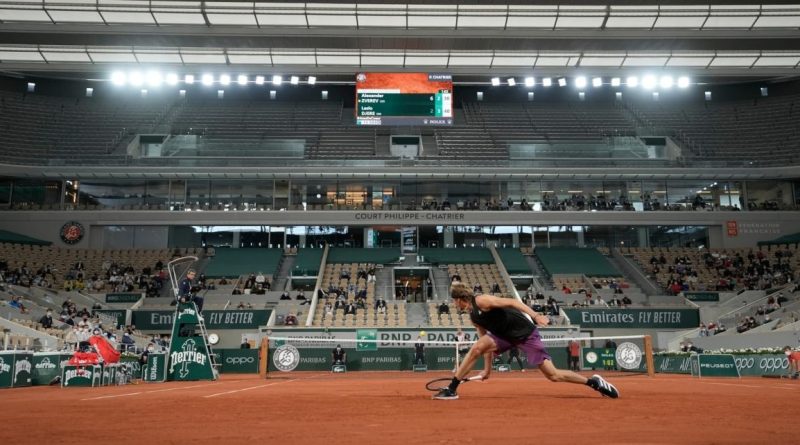French Open nightlife opens to sound of silence
Stars dazzle under lights in Paris for the first time but curfew keeps the crowd away.
At almost every French Open since 2005, Rafael Nadal does a little more than add a title to his mind-boggling collection: he also turns a year older. June 3 invariably falls on the second week of the clay-court Grand Slam, with Nadal invariably still hovering around in Paris.
And Roland Garros makes it a point to go the extra mile to add to the celebrations of their most celebrated champion. A special birthday cake is rolled out which Nadal either cuts on Court Philippe-Chatrier after his match in the company of thousands of spectators singing along, or with tournament organisers and staff sharing space—and some champagne—with the man of the moment at the Stade Roland Garros.
June 3, 2021, when Nadal turned 35, was a different kind of a bash for him. That’s aside from the fact that it came in the first week of the postponed Slam. The Spaniard played a match, but it ended around 45 minutes before midnight and without spectators watching the birthday boy in action, let alone singing for him. The cake was kept waiting in his hotel room and it was deep into the night when Nadal blew the candles on it.
Although matches have previously gone beyond sunset in Paris, Roland Garros became the third of the four Slams to feature official night sessions on their showpiece court for this edition. It was something even the 13-time champion experienced for the first time on Thursday when he beat Richard Gasquet. Nadal was the fourth player to compete in a night session after Serena Williams, Novak Djokovic and Daniil Medvedev.
However, unlike during the day when fans (up to 1,000 that will increase to 5,000 on the main courts next week) are permitted in the stands, the night sessions—starting 9pm local time in the twilight zone—have been played behind closed doors due to curfew restrictions by the French government starting at the same time. Of the 10 night sessions in this edition, only one will have spectators on court: the men’s quarter-final next Wednesday that will have up to 5,000 spectators, with the curfew pushed by a couple of hours after June 8.
For now, though, there’s an eerie feel to watching the stars dazzle in the night of La Ville Lumière (City of Light, as Paris is known) sans the fans. The atmosphere is like night and day—pun intended—compared to the other Slams. At the US Open in New York and to a large extent at the Australian Open in Melbourne, night gigs have a concert-like feel to them, with the courts filled to the brim (in non-pandemic times, of course) and the noise of overzealous fans—down a few drinks, no doubt—and music thrown in between games.
In Paris, the only noise at night has been of the ball thudding the racquets or the advertising boards, the umpires’ calls or of the odd police and ambulance sirens outside the stadium. Tennys Sandgren, who lost to Djokovic in their night match on Tuesday, frequently complained to the chair umpire about the little murmurs from the broadcasting and media area on court that were audible to him during play.
It’s a big reason why the historic Parisian night sessions have been a bit of a mixed bag for players thus far. Nadal said he would rather play in front of crowds. So did Djokovic.
“I didn’t mind playing in front of an empty stadium tonight, but hopefully, all my other matches in this tournament are going to have a crowd in the stands,” the world No. 1 said indirectly stating his preference for fan-filled day games. “It was strange, honestly. But I’m also honoured to play the first men’s match night session in the history of this tournament, of this court.”
The honour of playing the first match ever went to Williams, who played on Monday. When the French Tennis Federation announced its plans of scheduling one match at night—as opposed to a couple daily in New York and Melbourne—there were reports that each of those 10 matches could go to the men. But the French Open chose Williams, the 23-time Grand Slam champion, to begin their breakaway from tradition.
“When we made the program, several options were available to us. This one seemed to us symbolically the strongest and most interesting to initiate this first evening session,” tournament director Guy Forget told ESPN.
Williams is no stranger to shining under the stars. The American legend has won 44 of her 53 US Open night matches, according to the US Tennis Association. She got off the blocks with a night win at Roland Garros too, beating Irina-Camelia Begu in straight sets.
“It’s definitely a little different,” Williams said in her post-match press conference. “Ironically enough, night sessions are not my favorite matches, but I do have a good record at it. Clearly something about it gets me hyped. I have to say it was pretty cool to be able to play the first night session ever here at Roland Garros. That was something I thoroughly enjoyed.”
But as Williams wrapped up the match minutes shy of 11pm local time, she went towards her seat, waved her racquet around to the non-existent crowd and shook her head. She, too, could feel the difference of a night out in Paris.


